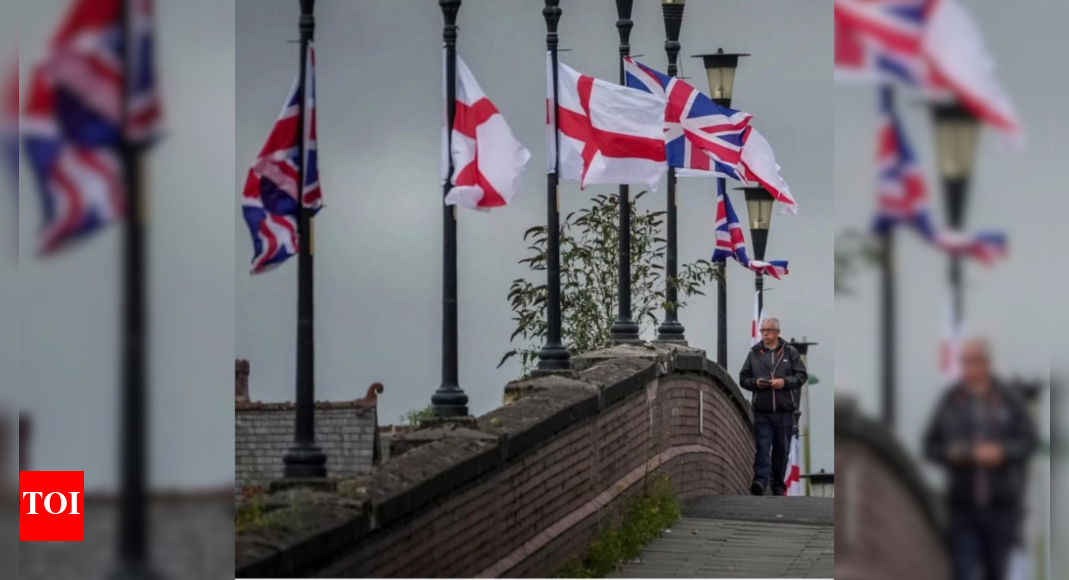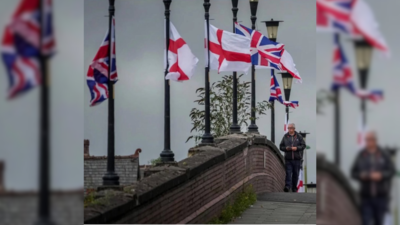Union flags draped over lampposts, painted across crosswalks, and hung from windows are sweeping across England. The campaign to raise the English flag, is hailed by supporters as an act of patriotism. Critics see it as a signal of emboldened far-right sentiment. The controversy escalated this week when billionaire Elon Musk extended support to the nationalist movement, amplifying the campaign by posting footage of flag-lined streets. “People of the great nations of Britain & Ireland, rally NOW… Fight, fight, fight! Soon, it will be too late,” Musk wrote on X. US Vice President JD Vance also weighed in, urging Britons to “push back against the crazies” who oppose flying the flag.
What do these flags represent?
In Britain, national flags rarely line streets outside royal celebrations, major sporting events or military commemorations. The sudden reappearance has revived long-standing questions over their meaning. The English flag — a red cross on a white background — has often carried uneasy connotations. It was prominent during the violent football hooliganism of the 1970s and 1980s, and the Union Jack was a staple of marches by the far-right National Front, which championed white supremacy.
Over the past decades, efforts have been made to reclaim both flags as unifying symbols. Yet, their re-emergence en masse has again sparked unease over whether they are being weaponised for political ends.
Why are the flags taking over UK streets now?
The latest surge in flags is tied to a campaign called “Operation Raise the Colours”, which began in Birmingham earlier this summer and has spread across the country. It comes against the backdrop of a heated political season dominated by immigration debates. Populist leader Nigel Farage of Reform UK recently pledged mass deportations of asylum seekers and withdrawal from international human rights treaties. His rhetoric follows protests at hotels housing asylum seekers. In Epping, a High Court ruling initially barred asylum seekers from being housed in a local hotel, though the government later overturned it on appeal. Other councils are considering similar legal challenges, complicating efforts to house hundreds of people currently in hotels. The tension escalated further after an Ethiopian asylum seeker in Epping was charged with sexually assaulting a schoolgirl.
Who is leading the campaign?
At its core is a Facebook group called “Weoley Warriors”, comprising about 2,000 members who call themselves “proud English men.” They have raised over £20,000 through crowdfunding, pledging to use the money solely for flags and related equipment. Anti-racism watchdog Hope Not Hate has identified several leaders of the campaign as long-time far-right activists and allies of Tommy Robinson (real name Stephen Yaxley-Lennon) has become a prominent voice.Campaign that started in Birmingham and East London, quickly spread to cities including Manchester, Bradford, Newcastle, Norwich, Worcester, Redditch, York, Teignmouth and the Isle of Wight. Organisers used encrypted social media platforms such as Telegram, along with Facebook and WhatsApp, to coordinate efforts. Volunteers employed ladders, cable ties, poles and cars to blanket streets with St. George’s Cross flags.
How has the administration reponded?
Authorities are facing a dilemma. Hurling a flag is not illegal, but painting symbols on public property, roundabouts, crossings, and roadways — could amount to criminal damage, police warn. Local councils are grappling with whether to treat the campaign as free expression or an act of intimidation in an already divided climate.

